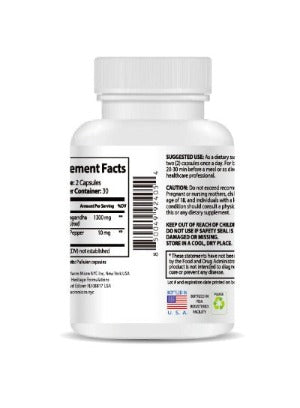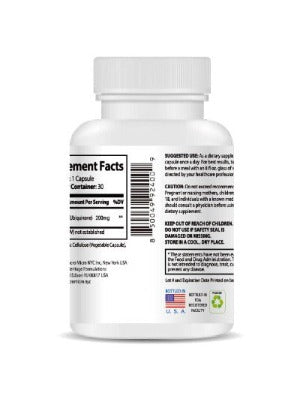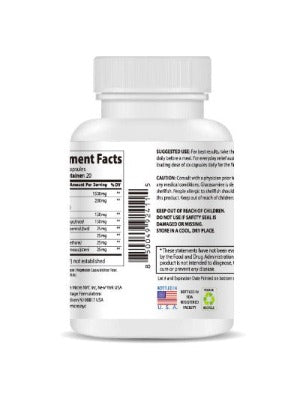How 86% of Contact Lens Users Found Relief with This Natural Remedy
If you're one of the 45 million Americans who wear contact lenses, you've likely experienced the frustration of dry, irritated eyes. Whether it's the gritty sensation at the end of a long day, the burning feeling when you blink, or the constant urge to rub your eyes, contact lens-related discomfort is more common than you might think. What's remarkable is that recent studies show 86% of contact lens users have found significant relief through natural remedies—without having to give up their lenses or rely on expensive treatments.
The solution isn't necessarily switching to glasses or enduring the discomfort. Instead, it's about understanding why contact lenses cause eye irritation and discovering natural, effective ways to restore comfort and eye health.
The Hidden Challenge of Contact Lens Wear
Contact lenses have revolutionized vision correction, offering freedom from glasses and clear peripheral vision. However, they also create unique challenges for eye health that many users don't fully understand. When you place a contact lens on your eye, you're essentially creating a barrier between your tear film and the outside environment.
This barrier can disrupt your eye's natural moisture balance in several ways:
- Reduced oxygen flow to the cornea
- Interference with natural tear distribution
- Increased protein and lipid deposits on the lens surface
- Altered blinking patterns that affect tear production
- Greater exposure to environmental irritants
Over time, these factors can lead to what eye care professionals call "contact lens intolerance"—a condition where your eyes become increasingly sensitive to lens wear, making comfortable use difficult or impossible.
Understanding Contact Lens-Related Eye Discomfort
The symptoms of contact lens discomfort can vary significantly from person to person, but they typically include:
- Dryness and burning sensations
- Excessive tearing or watery eyes
- Redness and inflammation
- Blurred or fluctuating vision
- Feeling like something is stuck in your eye
- Increased sensitivity to light
- Difficulty wearing lenses for extended periods
What makes these symptoms particularly challenging is that they often develop gradually. Many contact lens users adapt to mild discomfort, assuming it's just part of wearing lenses. However, this adaptation can mask underlying issues that, if addressed early, could prevent more serious problems down the road.
The key to successful contact lens wear isn't just finding the right lens—it's maintaining optimal eye health and creating an environment where your eyes can comfortably accommodate the lenses.
Why Traditional Solutions Often Fall Short
When contact lens users experience discomfort, they typically turn to conventional solutions like rewetting drops, different lens materials, or shorter wearing times. While these approaches can provide temporary relief, they often fail to address the root causes of the problem.
Rewetting drops, for example, provide immediate moisture but don't improve your eye's natural ability to produce quality tears. Similarly, switching to premium lens materials might reduce some irritation but doesn't address underlying inflammation or tear film instability.
Many users find themselves in a cycle of increasing dependence on artificial solutions, using more drops, switching lenses more frequently, or limiting their wearing time. This approach can be expensive, inconvenient, and ultimately unsustainable.
The Natural Approach: Working with Your Body's Healing System
The breakthrough that has helped 86% of contact lens users find relief comes from understanding that the eye has remarkable natural healing and adaptation capabilities. Instead of simply masking symptoms, natural remedies work to:
- Reduce inflammation that interferes with comfortable lens wear
- Support healthy tear production and quality
- Improve circulation to the eye area
- Provide essential nutrients for corneal health
- Create optimal conditions for lens tolerance
This approach recognizes that eye comfort isn't just about the contact lens itself—it's about the overall health of your ocular surface and your body's ability to maintain that health while wearing lenses.
Traditional Chinese Medicine: Ancient Wisdom for Modern Problems
Traditional Chinese Medicine (TCM) has been addressing eye health concerns for over 3,000 years, long before contact lenses existed. However, the principles of TCM are remarkably applicable to modern eye care challenges. TCM views eye health as connected to overall body wellness, particularly the liver and kidney systems, which are believed to nourish the eyes.
In TCM theory, many eye problems stem from:
- Heat and inflammation in the body
- Blood stasis affecting circulation
- Deficiency of essential nutrients reaching the eyes
- Imbalance between the body's cooling and warming energies
Natural remedies based on TCM principles work to restore balance and support the body's natural healing processes. This approach is particularly effective for contact lens users because it addresses both the immediate symptoms and the underlying imbalances that make eyes more susceptible to irritation.
The Science Behind Natural Eye Care
Modern research has validated many traditional approaches to eye health. Studies show that certain natural compounds can:
- Reduce inflammatory markers in tear fluid
- Improve tear film stability and quality
- Enhance corneal healing and repair
- Provide antioxidant protection against environmental damage
- Support healthy meibomian gland function
What's particularly exciting is that these natural compounds often work synergistically—meaning they're more effective when used together than when used individually. This explains why traditional formulations, which combine multiple beneficial ingredients, often outperform single-ingredient solutions.
Key Natural Ingredients for Contact Lens Comfort
Several natural ingredients have shown remarkable benefits for contact lens users:
Chrysanthemum flowers have been used in TCM for centuries to clear heat and reduce eye inflammation. Modern research confirms their anti-inflammatory and antioxidant properties, making them particularly beneficial for reducing the redness and irritation common with contact lens wear.
Goji berries are rich in zeaxanthin and other carotenoids that support retinal health and may improve tear production. They also provide essential vitamins and minerals that nourish the ocular surface.
Green tea extract contains powerful antioxidants called catechins that can reduce inflammation and protect against oxidative stress. Studies show it may help maintain healthy tear film composition.
Aloe vera has been recognized for its soothing and healing properties. When properly prepared for eye care, it can provide gentle relief from irritation while supporting tissue repair.
Chamomile offers anti-inflammatory and antimicrobial benefits, making it useful for reducing the risk of infection and inflammation that can occur with contact lens wear.
The Wisequest represents an innovative approach to combining these traditional ingredients with modern convenience. This natural eye patch harnesses the power of time-tested Chinese medicinal herbs in a format that's easy to use and specifically designed for today's contact lens users. The formula is carefully balanced to provide cooling relief while supporting the eye's natural healing processes, all without the side effects associated with pharmaceutical alternatives.
Creating the Optimal Environment for Contact Lens Success
Beyond using natural remedies, creating an environment that supports comfortable contact lens wear involves several key strategies:
Hydration and Nutrition
Your tear quality is directly affected by your overall hydration and nutritional status. Contact lens users should pay particular attention to:
- Drinking adequate water throughout the day (at least 8 glasses)
- Consuming omega-3 fatty acids from fish, flaxseeds, or supplements
- Getting sufficient vitamin A from leafy greens and colorful vegetables
- Ensuring adequate vitamin C intake to support collagen production in the eye
- Including zinc-rich foods to support tear production
Environmental Modifications
Simple changes to your environment can dramatically improve contact lens comfort:
- Using a humidifier to maintain optimal moisture levels
- Positioning yourself away from direct air conditioning or heating vents
- Taking regular breaks from screens to reduce eye strain
- Wearing wraparound sunglasses outdoors to protect from wind and UV rays
- Avoiding smoky or dusty environments when possible
Proper Lens Care and Hygiene
Even with natural remedies, maintaining excellent lens hygiene is crucial:
- Following proper cleaning and storage procedures
- Replacing lenses according to the recommended schedule
- Using fresh solution each time you store your lenses
- Avoiding water exposure while wearing lenses
- Keeping your hands clean when handling lenses
The Holistic Approach to Eye Health
What makes natural remedies so effective for contact lens users is their holistic approach to eye health. Rather than just treating symptoms, they work to:
- Improve overall eye health and resilience
- Reduce the inflammatory response that leads to discomfort
- Support your body's natural adaptation to contact lens wear
- Provide long-term benefits that improve with consistent use
- Offer relief without the side effects of pharmaceutical interventions
This comprehensive approach explains why 86% of contact lens users who try natural remedies experience significant improvement. They're not just masking symptoms—they're addressing the underlying factors that contribute to contact lens discomfort.
Building Your Natural Eye Care Routine
Creating an effective natural eye care routine for contact lens wear doesn't have to be complicated. The key is consistency and finding products that work synergistically to support your eye health.
Start with simple changes like improving your hydration and nutrition, then gradually incorporate natural remedies that address your specific symptoms. Many users find that combining environmental modifications with targeted natural treatments provides the best results.
The beauty of natural approaches is that they often provide benefits beyond just contact lens comfort. Users frequently report improved overall eye health, reduced fatigue, and better resilience to environmental stressors.
When to Seek Professional Guidance
While natural remedies are generally safe and effective, it's important to work with your eye care professional, especially if you experience:
- Severe or persistent pain
- Vision changes or disturbances
- Signs of infection such as discharge or extreme redness
- Inability to wear lenses comfortably despite trying various solutions
- Concerns about your eye health or treatment effectiveness
Your eye care provider can help you optimize your contact lens fit and care routine while supporting your use of natural remedies. Many professionals are increasingly open to integrating natural approaches with conventional care for the best outcomes.
The Future of Contact Lens Comfort
As more research validates the effectiveness of natural approaches to eye health, we're seeing a shift toward more holistic care for contact lens users. The 86% success rate with natural remedies represents just the beginning of this trend.
The future likely holds even more sophisticated natural formulations that combine traditional wisdom with modern scientific understanding. This evolution promises more effective, safer, and more accessible solutions for the millions of people who want to enjoy comfortable contact lens wear without compromising their eye health.
Making the Switch: Your Path to Comfortable Contact Lens Wear
If you're tired of dealing with contact lens discomfort, you don't have to accept it as inevitable. The natural approach that has helped 86% of contact lens users offers a safe, effective alternative to conventional treatments.
Start by assessing your current routine and identifying areas where you can make improvements. Consider how environmental factors, nutrition, and overall eye health might be affecting your comfort. Then, explore natural remedies that address your specific needs and symptoms.
Remember, the goal isn't just to eliminate discomfort—it's to create conditions where your eyes can thrive while wearing contact lenses. With the right approach, you can enjoy clear vision, comfort, and confidence in your contact lens wear for years to come.
Frequently Asked Questions About Natural Contact Lens Relief
Q: How quickly can I expect to see results from natural remedies for contact lens discomfort?
A: Most contact lens users begin noticing improvements within the first few days of using natural remedies, particularly for immediate symptoms like dryness and irritation. However, the most significant benefits typically develop over 2-4 weeks of consistent use. Natural remedies work by supporting your eye's healing processes and reducing inflammation, which takes time to fully manifest. Some users report immediate cooling and soothing effects, while deeper benefits like improved tear quality and reduced sensitivity develop gradually. The key is consistency—natural approaches work best when incorporated into your daily routine rather than used sporadically.
Q: Can I use natural eye care products while wearing my contact lenses, or do I need to remove them first?
A: This depends on the specific natural product and its formulation. Some natural remedies, like cooling eye patches, are designed to be used when contact lenses are removed, typically at the end of the day or during breaks from lens wear. Others, such as certain natural eye drops specifically formulated for contact lens compatibility, may be safe to use while wearing lenses. Always check with the product manufacturer and your eye care professional before applying any product while wearing contacts. Many users find that incorporating natural treatments into their lens-removal routine provides the most benefit and convenience.
Q: Are natural remedies safe to use with all types of contact lenses, including daily disposables and extended wear lenses?
A: Natural remedies based on traditional ingredients are generally safe for use with all types of contact lenses because they typically don't interact directly with the lens material. However, the timing and method of use may vary depending on your lens type. Daily disposable users often have more flexibility since they're discarding lenses each day, while extended wear users need to be more careful about when and how they use additional products. The beauty of natural approaches is that they focus on improving your overall eye health rather than just coating the lens, making them compatible with various lens types and wearing schedules.
Q: What makes traditional Chinese medicine ingredients more effective than synthetic alternatives for contact lens users?
A: Traditional Chinese Medicine ingredients offer several advantages over synthetic alternatives. First, they typically work through multiple mechanisms simultaneously—for example, chrysanthemum doesn't just reduce inflammation but also provides antioxidant protection and supports circulation. Second, TCM ingredients have been used safely for thousands of years, with well-documented safety profiles and minimal side effects. Third, they often work synergistically when combined, creating effects that are greater than the sum of their parts. Finally, TCM approaches focus on addressing root causes rather than just symptoms, leading to more sustainable relief. Many contact lens users find that natural ingredients provide gentler, more comprehensive support for their eye health.
Q: How do I know if my contact lens discomfort is severe enough to warrant professional treatment, or if natural remedies are sufficient?
A: Natural remedies are excellent for mild to moderate contact lens discomfort, including dryness, irritation, and end-of-day fatigue. You should consider professional evaluation if you experience severe pain, vision changes, discharge, extreme redness, or if you're unable to wear your lenses at all. Additionally, if you've tried natural approaches consistently for 4-6 weeks without improvement, it's worth consulting your eye care professional. The good news is that natural remedies can often be used alongside professional treatments, and many eye care providers are supportive of integrative approaches. Don't hesitate to discuss your use of natural products with your eye doctor—they can help you optimize your overall eye care strategy.









